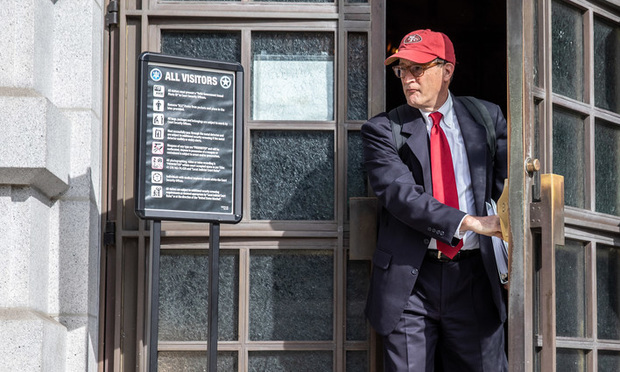Mazars, Impeachment & Mueller: Judges Review House's Year of Trump Legal Fights
Judges on the D.C. Circuit frequently referenced the House's other Trump lawsuits it's filed or been party to as they heard en banc arguments in two House cases.
April 28, 2020 at 07:30 PM
7 minute read
 Douglas Letter, general counsel to the U.S. House of Representatives. (Photo: Jason Doiy/ALM)
Douglas Letter, general counsel to the U.S. House of Representatives. (Photo: Jason Doiy/ALM)
House Democrats filed their first lawsuit against the Trump administration in April of last year, a challenge to President Donald Trump's diversion of military funds for border wall construction. And on Tuesday, several lawsuits and an impeachment trial later, the U.S. Court of Appeals for the D.C. Circuit heard en banc arguments in that case.
The appeals court in D.C. has already ruled on three of the House lawsuits. And as they heard the arguments in a pair of cases that were previously unrelated Tuesday, the judges tied the legal questions back to the lawsuits they've ruled on, to Trump's impeachment and to the House cases now pending before the U.S. Supreme Court—a sign of just how frequent and intertwined the congressional litigation has become over the past 12 months.
In addition to the border wall challenge, the judges heard arguments in a case over a House subpoena to former White House counsel Don McGahn, who has since returned to Jones Day. Legal experts say that lawsuit has far broader implications for the House's other pending lawsuits in D.C. federal court, after a divided panel ruled earlier this year that lawmakers cannot sue to enforce subpoenas against the executive branch.
Judge David Tatel, who wrote the circuit's majority opinion upholding a separate congressional subpoena for Trump's tax records from the accounting firm Mazars, began his questioning of DOJ lawyer Hashim Mooppan by asking about an order the justices handed down in the tax subpoena cases Monday.
The Supreme Court asked for briefing from the parties and Solicitor General Noel Francisco "addressing whether the political question doctrine or related justiciability principles bear on the court's adjudication of these cases," suggesting the court is considering dismissing the cases for a lack of jurisdiction.
Tatel asked Mooppan, in the case the circuit finds the House does have standing in the border wall and McGahn cases, if the Justice Department would "have a backup political question argument." Mooppan said the department has not pushed the argument in either case, and wouldn't in the future.
Tatel then asked if the McGahn case "is exactly like" the one on the Mazars subpoena, noting that McGahn is no longer working with the Trump administration despite the Justice Department representing him in the case.
Mooppan replied that McGahn's testimony would cause an institutional injury to the administration and therefore was an issue that could not be resolved in court, but that Trump was suing in his private capacity in the Mazars case to shield those financial records.
The legal arguments tied to impeachment also played a significant role during the hearing. When asked if the House could use impeachment to get information from an unwilling official or agency, House general counsel Douglas Letter replied, "My main answer there is, been there, done that."
Letter said, as he sat in on the Senate impeachment trial, he "heard over and over again White House counsel—not just the personal lawyers for the president, the government lawyers for the president—say the many subpoenas issued by the House could be ignored because the House should have gone to court to enforce those subpoenas."
He said that contradicted the Justice Department's claims, as Mooppan and the DOJ argued Congress could never go to court against the executive branch.
And when Judge Patricia Millett asked about whether an individual could go to court if they received a congressional subpoena and a conflicting instruction from the administration to not comply, Mooppan raised a lawsuit filed by former national security deputy Charles Kupperman, who filed a complaint under similar circumstances during the impeachment inquiry.
Kupperman, represented by Chuck Cooper, sought a court order clarifying which directive he should follow. The administration argued the case did not belong in court, the House withdrew the subpoena to avoid a drawn out legal battle, and a federal judge dismissed the case as moot.
Judge Judith Rogers also brought up impeachment, tying it more closely to special counsel Robert Mueller's report. The House sued to obtain grand jury materials redacted from the report, and Rogers wrote the appellate court's majority opinion in their favor. The Justice Department is now preparing to take the case to the Supreme Court.
Rogers on Tuesday said "there were certain questions that the special counsel deferred to the impeachment process," and asked Mooppan if the DOJ believed there could be any harm "to the constitutional responsibility of the House, to investigate, to get … all relevant facts in order to make a considered decision on a. whether to impeach, and b. on what counts." House lawyers have argued they need McGahn's testimony to determine if they should file additional articles of impeachment against Trump.
Mooppan said not accessing the information would not nullify the House's ability to vote to impeach. "Congress doesn't even have a right to information," Mooppan said, citing the text of the Constitution. He said any rights to documents and testimony that lawmakers do have are "ancillary and implied."
While not explicitly mentioned in the arguments, the House's pending litigation to enforce other congressional subpoenas, like that for Trump's federal tax returns, hung over the hearing. Letter said if the House lost the ability to get judicial enforcement of subpoenas, the mandates for information would be reduced to "a joke."
The judges seemed to recognize that the ruling that comes out of Tuesday's arguments will have a significant impact on those other House suits, and reshape how the House conducts oversight.
Chief Judge Sri Srinivasan asked Mooppan about the possibility of the House increasingly using its inherent contempt powers, which can involve the arrest and detention of individuals who don't comply with subpoenas, if lawmakers can no longer go to court. Mooppan said during arguments that the DOJ doesn't believe the House can arrest recalcitrant administration officials.
"It just seems a little bit odd that we would create a regime in which, in order to protect the separation of powers, the incentive—the impulse would be to go down a road that would create a greater separation-of-powers conflagration in the form of a detention of an executive branch official," Srinivasan said.
"Even if the consequences are true, I don't think it should change your analysis," Mooppan answered.
Read more:
Warning of Dramatic 'Upset' of Constitutional Powers, US House Asks Full DC Circuit to Rehear McGahn
DOJ Says It Will Fast-Track Mueller Grand Jury Fight to SCOTUS
US House Can't Sue or Arrest Don McGahn in Subpoena Fight, DOJ Tells En Banc DC Circuit
Impeachment Is Almost Over. Here Are the Dozens of Lawyers Who Got Involved.
This content has been archived. It is available through our partners, LexisNexis® and Bloomberg Law.
To view this content, please continue to their sites.
Not a Lexis Subscriber?
Subscribe Now
Not a Bloomberg Law Subscriber?
Subscribe Now
NOT FOR REPRINT
© 2025 ALM Global, LLC, All Rights Reserved. Request academic re-use from www.copyright.com. All other uses, submit a request to [email protected]. For more information visit Asset & Logo Licensing.
You Might Like
View All
‘Diminishing Returns’: Is the Superstar Supreme Court Lawyer Overvalued?

DC Lawsuits Seek to Prevent Mass Firings and Public Naming of FBI Agents
3 minute read
Law Firms Mentioned
Trending Stories
- 1The End of Innocence? DEP’s End Run Around ‘All Appropriate Inquiry’ Spill Act Protections
- 2Pistachio Giant Wonderful Files Trademark Suit Against Canadian Maker of Wonderspread
- 3New York State Authorizes Stand-Alone Business Interruption Insurance Policies
- 4Buyer Beware: Continuity of Coverage in Legal Malpractice Insurance
- 5‘Listen, Listen, Listen’: Some Practice Tips From Judges in the Oakland Federal Courthouse
Who Got The Work
J. Brugh Lower of Gibbons has entered an appearance for industrial equipment supplier Devco Corporation in a pending trademark infringement lawsuit. The suit, accusing the defendant of selling knock-off Graco products, was filed Dec. 18 in New Jersey District Court by Rivkin Radler on behalf of Graco Inc. and Graco Minnesota. The case, assigned to U.S. District Judge Zahid N. Quraishi, is 3:24-cv-11294, Graco Inc. et al v. Devco Corporation.
Who Got The Work
Rebecca Maller-Stein and Kent A. Yalowitz of Arnold & Porter Kaye Scholer have entered their appearances for Hanaco Venture Capital and its executives, Lior Prosor and David Frankel, in a pending securities lawsuit. The action, filed on Dec. 24 in New York Southern District Court by Zell, Aron & Co. on behalf of Goldeneye Advisors, accuses the defendants of negligently and fraudulently managing the plaintiff's $1 million investment. The case, assigned to U.S. District Judge Vernon S. Broderick, is 1:24-cv-09918, Goldeneye Advisors, LLC v. Hanaco Venture Capital, Ltd. et al.
Who Got The Work
Attorneys from A&O Shearman has stepped in as defense counsel for Toronto-Dominion Bank and other defendants in a pending securities class action. The suit, filed Dec. 11 in New York Southern District Court by Bleichmar Fonti & Auld, accuses the defendants of concealing the bank's 'pervasive' deficiencies in regards to its compliance with the Bank Secrecy Act and the quality of its anti-money laundering controls. The case, assigned to U.S. District Judge Arun Subramanian, is 1:24-cv-09445, Gonzalez v. The Toronto-Dominion Bank et al.
Who Got The Work
Crown Castle International, a Pennsylvania company providing shared communications infrastructure, has turned to Luke D. Wolf of Gordon Rees Scully Mansukhani to fend off a pending breach-of-contract lawsuit. The court action, filed Nov. 25 in Michigan Eastern District Court by Hooper Hathaway PC on behalf of The Town Residences LLC, accuses Crown Castle of failing to transfer approximately $30,000 in utility payments from T-Mobile in breach of a roof-top lease and assignment agreement. The case, assigned to U.S. District Judge Susan K. Declercq, is 2:24-cv-13131, The Town Residences LLC v. T-Mobile US, Inc. et al.
Who Got The Work
Wilfred P. Coronato and Daniel M. Schwartz of McCarter & English have stepped in as defense counsel to Electrolux Home Products Inc. in a pending product liability lawsuit. The court action, filed Nov. 26 in New York Eastern District Court by Poulos Lopiccolo PC and Nagel Rice LLP on behalf of David Stern, alleges that the defendant's refrigerators’ drawers and shelving repeatedly break and fall apart within months after purchase. The case, assigned to U.S. District Judge Joan M. Azrack, is 2:24-cv-08204, Stern v. Electrolux Home Products, Inc.
Featured Firms
Law Offices of Gary Martin Hays & Associates, P.C.
(470) 294-1674
Law Offices of Mark E. Salomone
(857) 444-6468
Smith & Hassler
(713) 739-1250









